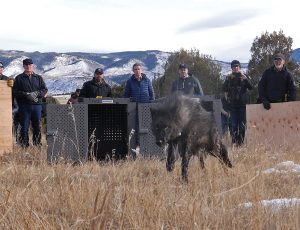NRCS in Colorado to offer funding for using tools to protect livestock from wolves, other large carnivores
DENVER — USDA’s Colorado Natural Resources Conservation Service office and Western Landowners Alliance are announcing $2.5 million in funding opportunities for agricultural producers in counties that have experienced significant livestock losses to wolves and other large carnivores. Agricultural producers interested in implementing land management activities including range riding, carcass management and electric fencing to enhance livestock safety and reduce carnivore-livestock conflicts have until Feb. 7, 2025 to apply.
The sign-up period for these funds will begin Jan. 10, 2025. Agricultural producers interested in learning more or submitting an application should contact the Craig, Steamboat Springs, Walden, Kremmling, Meeker, Glenwood Springs or Gunnison USDA Service Centers at the phone number provided by the Service Center Locator at https://offices.sc.egov.usda.gov/locator/app. Fully completed application packets must be received by the service center no later than 4 p.m. MST on Feb. 7 to be considered.
Producers are invited to join Colorado NRCS, WLA and other partners for a webinar on Jan. 17 from 1 to 2 p.m. MST for a detailed overview of this funding opportunity and a chance to ask questions.
These resources through a Regional Conservation Partnership Program award to Western Landowners Alliance and Heart of the Rockies Initiative to support livestock producers in predator-rich environments.
CONFLICT PREVENTION
This RCPP is a partner-driven approach to conservation administered by the USDA Natural Resource Conservation Service that funds solutions to natural resource challenges on agricultural lands, and is the result of years of grassroots producer-led efforts to secure reimbursements for costly conflict prevention practices.
“It’s important that producers have the resources to be able to address some of the challenges of sharing space with these species, because it’s so important to keep these private lands intact for a whole host of things — food, fiber, habitat for wildlife and vibrance of rural communities,” said Matt Collins, Working Wild Challenge manager with Western Landowners Alliance. “Together with compensation, control and collaboration, expanding funding opportunities for these tools is an important piece of the puzzle for reducing conflicts that can really affect a producer’s bottom line.”
In order to streamline access to these tools, Colorado NRCS is working in close coordination with other agencies and entities in the state, including the Colorado Department Agriculture, Colorado Parks and Wildlife and Colorado Cattlemen’s Association.
“Producers have the best knowledge on the ins and outs of their operation and what tools may or may not fit into their stewardship practices,” said Erin Karney Spaur, executive vice-president of Colorado Cattleman’s Association. “These producers are on the front lines, managing the brunt of impacts from predators and wolves in this state, and we need to make sure programs are streamlined, accessible, and tailored to meet the needs of those experiencing conflicts.”
“Importantly, this funding provides opportunities for agricultural producer led- and implemented-conflict reduction,” said Collins. “For instance, if a producer that receives RCPP funding would like to hire a range rider to monitor livestock and apply carnivore deterrents, they can pick the individual they’d like to be out there doing it, including paying for their own time and labor, hiring a local or bringing someone in.” Western Landowners Alliance is working with the Colorado Department of Agriculture and other partners to host trainings for range riders in the spring of 2025 to ensure interested parties have the skills to reduce conflicts, and that there is a trained workforce available.
“Colorado Department of Agriculture, Colorado Parks and Wildlife, Wildlife Services, Natural Resources Conservation Service, Colorado State University Extension and Western Landowners Alliance are working closely with local livestock producers to ensure that Colorado’s ranching industry has the tools they need to build resiliency. This includes a variety of non-lethal conflict reduction strategies and on the ground support,” said Dustin Shiflett, CDA’s Non-Lethal Conflict Reduction program manager.
To be eligible for the NRCS funding opportunity, an agricultural producer must have updated farm records with the Farm Service Agency and meet all program and project eligibility requirements. Project applications will be evaluated in the first quarter of 2025, with contracts for approved projects signed in early summer 2025. Funding reimbursements are expected to begin in summer 2025. Subsequent signup periods will occur each year through 2028 as long as there is available funding for new projects.




